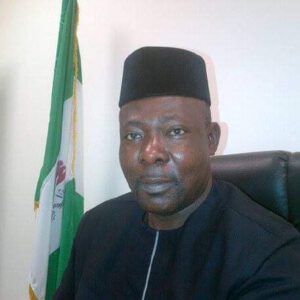By Emeka Nwosu, PhD
On Tuesday, November 16, 2021, at the main Auditorium of Nnamdi Azikiwe University, Awka, Anambra State, the 10th edition of the Zik Lecture series was staged to commemorate the birthday of the first President of Nigeria and one of the founding fathers of the country, Dr. Nnamdi Azikiwe. The star attraction was Dr. Kayode Fayemi, the Governor of Ekiti State and Chairman of Nigerian Governors` Forum (NGF), who was the Guest Speaker.
The general theme of the lecture centred on Security, Governance and Nation Building. But Governor Fayemi spoke specifically on “Nation Building: Between Restructuring and Autonomy”. Fayemi who holds a doctorate degree on War Studies did not disappoint. His presentation was thought-provoking as it was engaging and intellectually stimulating. He kept the Auditorium which was filled to its capacity spellbound with his expositions and postulations on the way forward for our beleaguered country currently besieged on all fronts by centrifugal forces.
The guest lecturer commenced the brilliant presentation by paying glowing tribute and befitting homage to the memory of Zik of Africa, the great Pan-Africanist who led the nationalist movement in Nigeria and decolonization of the continent. Dr. Fayemi also went deep into the archives to refresh his esteemed audience on the pragmatic roles played the great Zik alongside such iconic historical figures like W.E. Dubois and George Padmore in the Black Movement to give the black man a respectable place in a world dominated by the white Caucasians.

He also noted how Zik inspired a generation of African leaders like Kwame Nkrumah and Mwalimu Julius Nyerere in the struggle for the liberation of Africa from the clutches of imperialism and neo-colonialism. Fayemi informed the gathering how Zik, through his group of newspapers and writings campaigned vigorously for the mental and political emancipation of the continent. Fayemi accurately noted that Zik`s book, Renascent Africa, published in 1937 was path-breaking as it gave intellectual impetus to the Pan-Africanist movement. In that powerful book, the great Zik postulated five constructs through which Africa can attain a pride of place amongst the continents of the world. Those constructs include what Zik called ‘mental emancipation, social regeneration, cultural revivalism, economic determinism and political risorgimento’. Through his works, he was able to mobilize the people of Africa in the struggle for economic and political freedom.
Fayemi noted that Zik, more than any of his contemporaries, worked assiduously to build a united Nigeria in which every citizen or group would be free to realize its full potentials and aspirations without let or hindrance. He recalled all the various unifying roles Zik played in the life of the nation, adding that Zik was never a captive of tribe; rather he believed in a united and bigger Nigeria. He was thus propelled by that larger picture in all his politics. There is no doubt that the liberal American education which Zik acquired while he sojourned in the United States was the underlying factor that defined the worldview of the celebrated African statesman in whose memory and honour the Zik Lecture series was instituted by the University in Awka named after him.
Drawing from the rich experiences of Zik and what he stood for in Nigeria and Africa, Fayemi noted strongly that the lot of Nigerians would be better served in a united entity. He, therefore, cautioned against separatist agitations, as such campaigns have continued to result in needless deaths, pains and destructions. In his words: “There is absolutely nothing heroic about dying foolishly for a cause for which dialogue and negotiation can provide pathways to workable solutions. Whatever is worth fighting for is worth staying alive for”.
Fayemi believes that the best way to go is dialogue, especially in a heterogeneous and complex country like Nigeria. For him, restructuring the country offers the best solution to the problems that have continued to assail Nigeria`s efforts at nation building. He noted as follows: “If separation and secession are not as easy or simple as their proponents imagine, and given that they do not provide any guarantee that a better future can be secured through them, the demands for a national restructuring would seem to me to be worth keeping on the table for deeper consideration. In doing so, we have a duty to frame and contextualize the quest for restructuring as part of a normal process of regular and periodic adjustment and recalibration of governance arrangements to changing times and contexts”.
Governor Fayemi could not have put it better. Restructuring Nigeria, I believe, will help us to overcome the underlying factors that feed into the clamour for secession and self-determination. The country as it is presently configured is skewed heavily in favour of some ethno-religious groups in the country. The evident marginalization and political exclusion of the South East Zone are the underlying factors that propel the agitations in the Zone. Like Fayemi correctly noted, separatism and secession cannot be a realistic solution, especially in the light of the misfortune that has befallen such a country like South Sudan which has not known peace and development since it separated from Sudan in 2011. Other unsavoury experiences Fayemi cited include Burundi and Somalia which, in spite of their cultural homogeneity, have remained theatres of conflicts.
The takeaway from the lecture is that we, as a people, are better off in a united and restructured Nigeria in which every part of the country will be free to pursue its aspirations without let or hindrance. The agitations will cease the moment the Government of the day shows good faith and sincerity of purpose by initiating a national dialogue with all aggrieved groups with a view to reworking the terms of the union and ensuring equity and balance in the Federation.
• Dr. Nwosu, a public policy analyst wrote from Abuja.